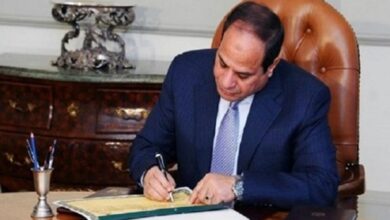The Muslim Brotherhood, Egypt’s biggest opposition bloc, said on Monday the government had approved most of its candidates for upcoming legislative polls, but analysts say the group’s chances of winning seats is slim.
The Brotherhood, which is officially banned but has affiliated candidates in parliament, said the government had approved 12 of the 14 candidates it put forward to run for seats in Egypt’s Shura Council, the upper house of parliament.
How the Brotherhood fares in the Shura vote will provide clues about what to expect in a second election later this year — seen as more important — for the lower house of parliament, where the group controls a fifth of seats.
“The Brotherhood’s rivals from the ruling National Democratic Party and security forces will work to prevent them winning votes,” said Nabil Abdel-Fattah, an analyst at the al-Ahram Center for Strategic and Political Studies.
Egyptian officials insist voting is free and fair.
A government election panel approved a total of 490 candidates from President Hosni Mubarak’s ruling party and opposition groups to run in the June 1 vote, which will renew 88 seats in the 264-member council.
A total of 575 candidates were nominated as candidates, but some were rejected because, for example, they were found to have not completed obligatory military service.
Politicians linked to the Brotherhood make up by far Egypt’s biggest opposition bloc in the lower house. Brotherhood candidates run as independents in order to secure seats.
“We have 12 candidates in total who will enter Shura Council elections,” Brotherhood member Saad Hussein said.
The Brotherhood has never won any seats in the Shura Council, which reviews draft laws before sending them to the lower house for a final vote. The government said two Brotherhood candidates were rejected for failing to complete military service, which the Brotherhood denies.
The Shura vote could also signal what is ahead in a presidential vote next year, which is sure to be closely watched as the Arab world’s most populous nation struggles to energize its economy, combat widespread poverty and modernize.
Mubarak, who just turned 82 and whose health has been in question after recent surgery in Germany, has not said whether he will run for a sixth six-year term. If he doesn’t, many Egypt watchers expect his son Gamal to be a top contender for the job.
Mubarak has the power to appoint 88 of the council’s seats, while the remaining 176 seats are elected in two blocks of 88 every three years. It is dominated by the ruling party.
Analysts say turnout for the Shura vote is typically extremely low and the bigger constituencies for each Shura seat mean many Egyptians have little idea about who is standing.
The smaller constituencies of lower house seats and greater public interest in that vote means Brotherhood candidates, often well known in the local community, have managed to secure seats.
“The group knows it will not win any (Shura) seats just like in 2007 elections but they take these elections as a warm-up for the parliament vote in which they can manage to secure seats,” said political analyst Diaa Rashwan.




